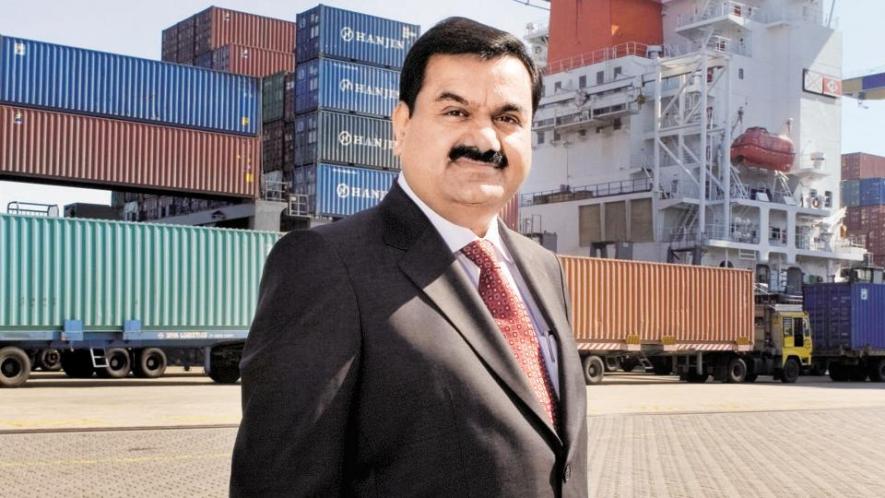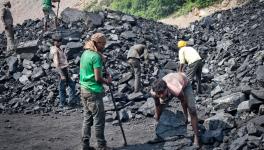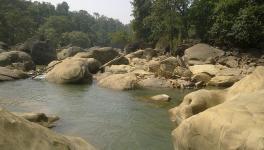Did Queensland Vote Coal and Adani in Australia’s ‘Climate Elections’

Image Courtesy: Hindustan Times
There are two top story streams from Australia’s elections results last Saturday. One is about the Liberal Coalition’s surprising—even to itself—sweep of the polls. The other is mining magnate Clive Palmer, and what he did. Prime Minister Scott Morrison thanked Queensland in his acceptance speech; ‘How good is Queensland!’ he said, thinking about the sweep of blue across Australia’s mining-rich frontier state. The Liberal Party firmly secured its three ultra-marginal seats in Central Queensland where the Adani mine is situated, captured Labor’s only seat in the region near Townsville, and received the full flow of preference benefits from Clive Palmer’s United Australia Party. By the end of counting, Labor’s vote fell to a staggering 27.4 per cent and it held only five out of thirty Queensland seats, with the divide over Adani said to have played a strong role.
The Liberals also had unexpected wins in several other places, such as the seats of Braddon and Bass in Tasmania, and former Prime Minister Malcom Turnbull’s seat of Wentworth in Eastern Sydney, which had been snatched by an Independent in the October 2018 by polls after Scott Morrison took over as Prime Minister and Turnbull quit Parliament. Malcolm Turnbull’s treatment by the Coalition Party had angered many Conservative voters, and it was believed that success in Wentworth would be followed by a defeat in the 2019 Federal Elections. Labor’s decisive victory in the Victorian elections last November made a Liberal defeat on Saturday appear even more imminent. Although the last phase of opinion polls tied the two major parties at a 50:50 chance of winning, surveys over the last three years had consistently showed Labor ahead of the Liberal Coalition.
Also read: Adani Is Byword for Government’s Climate Inaction as Australia Gears for Elections
Over the last three years, mobilisations around the country had pressed for political action on climate change. The Stop Adani movement had even been able to generate targeted political pressure even at the electoral level, and Liberal MPs from Victoria had expressed concerns over the Government’s support for the mine. Malcolm Turnbull’s expulsion was not taken kindly by his electorate, doubly on account of the Coalition’s lack of commitment on climate change. But with the post-climate-election post mortem underway at the moment, the details of the great divide between Queensland and Victoria, both Labor-held at the state level, are becoming evident. And the analysis is pointing at two big problems; one, the role of big money and Rupert Murdoch’s captured Newscorp media, and the other, the priority of people itself.
Clive Palmer, who has emerged as kingmaker in Australia’s 2019 Federal Elections has benefitted from both. He is the owner of the monster coalmine in the Galilee Basin that can only go ahead once Adani’s Carmichael proceeds, “unlocking” the other Galilee Basin coal projects in the pipeline. The Adani mine’s water management plans were controversially rushed through federal approvals two days before election campaigning kicked off. A lion’s share of false and exaggerated claims that characterised the elections campaign, particularly those targeting Labor and the Greens have been attributed to Palmer and his recently floated United Australia Party, whose populist “Make Australia Great!!” campaign slogan breathes America’s Trump in every syllable.
In fact, Palmer has just come out declaring — veni, vidi, vici (‘I came, I saw, I conquered’) style — that he “decided to polarise the electorate” with an anti-Labor advertising blitz in the last two weeks of campaigning to avoid a “disaster for Australia”, instead of trying to improve his party’s election prospects. The attack on Labor’s policies and Bill Shorten “improved the government’s position”, and it was a better service to the nation than donating to charities, Palmer said in a radio interview in Queensland this morning. Rupert Murdoch’s News Corp media’s monopoly throughout the region also proved effective in monopolising opinions; the establishment’s newspapers had mounted a sustained propaganda campaign for Carmichael.
Also see: 'The Adani Coal Mining Project in Australia is Yet to Achieve Financial Closure'
Clive Palmer had initially fielded UAP candidates in all Queensland seats and spent $60 million AUD on advertisements, apart from cutting a deal that would see his party’s preferences flow to the Liberals. In the end, the UAP did not manage to win a single seat in Parliament and secured only 3.4 per cent of the national primary vote. Palmer has claimed that the Coalition won a majority on the back of his preferences. The other strong minor party in Queensland, the xenophobic One Nation led by Pauline Hanson, from whom preferences once again flowed to the Liberal Party, secured only 3 per cent of the national primary vote.
The second big question is around why Queenslanders voted the way they did, or rather, what were their motivations to believe Palmer’s propaganda and the already disproven jobs figures for the Adani project over warnings about coal’s economic unviability and climate risks?
Reading half a dozen reflective and analytical articles since Queensland’s ‘blue sweep’ and the subsequent social media backlash against the state’s voters, the deeper reasons for the enduring divide between Queensland and Southern states tend to lean strongly in the direction of Queensland’s regionalism and reliance on mining. It is Australia’s only state where the majority of the population live outside the capital city, creating a dominant regionalism that translates into political clout. These various regions developed as separate economies and production centres over time, largely for extractive industries with an export focus and therefore very vulnerable to the boom and bust cycles of global resource trade.
Federal politics has largely been incapable of understanding such regional variances. Analysis says that Labor’s policy rich platform in this election has ticked boxes with metropolitan voters and environmentalists. At the same time it has managed to alienate its working class base in regional Queensland who are susceptible to job losses and also harbour a strong disdain for being told by outsiders, particularly Southerners, how they should manage their economies. This has played a critical role in swinging a critical share of primary votes in the state towards minority parties.
Also read: ‘No Means No’: Adani’s Land Woes in Australia
Palmer’s United Australia and Pauline Hanson’s One Nation, although fundamentally populist and reactionary without coherent plans or visions of their own who ultimately reinforce the state’s mining status quo, have been effective in capturing these dissatisfactions of voters who feel left out. Matt McDonald from the University of Queensland boils this down to an issue of socio-economic, lifestyle and educational gaps between the inner city and regional voters whose livelihoods are entwined with the extractive industry. Even though climate change is by now a real and pressing concern amongst many farmers in regional Queensland who worry about water shortages and increasing droughts, for the majority of regional Queenslanders climate change and stopping coal poses an immediate economic threat. And as a result of these parties’ preferencing priorities, the Liberal Party has sealed a decisive victory in the state!
*********************
Various environmental groups around the country, the highly visible Stop Adani movement, and striking school students in their tens of thousands and sympathetic parts of the Australian media had us in metropolitan areas believe that this was Australia’s second climate election, the first being in 2007 that brought Labor’s Kevin Rudd to power against the Liberal incumbent John Howard. In inner-city seats like Melbourne’s Batman, the Greens were gaining on Labor on the issue of Adani and climate, forcing their leader Bill Shorten to equivocate on the Adani mine. Although Labor’s climate policy platform does not explicitly state so, the party has accepted the inevitability of coal’s economic decline and the need to act responsibly for the sake of climate by tackling fossil fuel burning.
While the Liberal Coalition has been a consistent champion of the Carmichael project, in the last four years, Labor has shifted away from actively politically championing Adani’s mine. As a last sign of this position, the Queensland Labor government left the decision making about Adani’s water management plans till after the federal elections, sending a distinctly different signal from the Coalition to voters. These moves have been bolstered by resonances from within the coal and mining industry, most notably Newcastle, the world’s largest coal port’s plans to diversify, and Australia’s largest coal mining company Glencore’s commitment to cap global coal output.
But in the end, coal and mining have won in Queensland, at least for the time being. Since Sunday the chorus to approve Carmichael has been drummed up. While Labor, brutally wounded, reconfigures its leadership and predictably swings to the right, signs of capitulation have started showing. Queensland Premiere Annastacia Palaszczuk has asked the state’s Coordinator General to oversee Adani’s approval process, stating that both the community and she were “fed-up” of waiting.
Also see: Adani Group Chasing Carmichael Coal Mine Dream
The election results raise questions about Adani’s and Queensland’s future. Could the state’s approval for Adani’s Black Throated Finch Management Plan and Groundwater Management Plans be imminent, removing the last feeble bureaucratic roadblocks to Carmichael? And could what the Wangan and Jagalingou traditional owners have been able to resist for seven long years despite the colonial nature of Australia’s Native Title Act be finally extinguished: their claim to ancestral lands on the mine-site? As the dust settles over the next few weeks, Australia and the world will know. It might not be an exaggeration to state that regional Queensland’s vote this election will leave a critical mark in Australia’s economy and climate.
In the meantime coal’s terminal decline continues; the licence for the China Stone mega mine adjoining Carmichael has been quietly withdrawn putting thousands (of the thousands) of Galilee jobs at doubt. At a time when the world has come to a crunch over climate change and coal is not showing signs of booming any more, has billionaire Palmer, in playing to the fears of mining dependent regional voters, acted in anyone but his own interest?
The writer is a PhD scholar at the School of Social and Political Sciences, University of Technology, Sydney. Her research compares energy politics and environmental mass movements in India and Australia. The views are personal.
Get the latest reports & analysis with people's perspective on Protests, movements & deep analytical videos, discussions of the current affairs in your Telegram app. Subscribe to NewsClick's Telegram channel & get Real-Time updates on stories, as they get published on our website.























